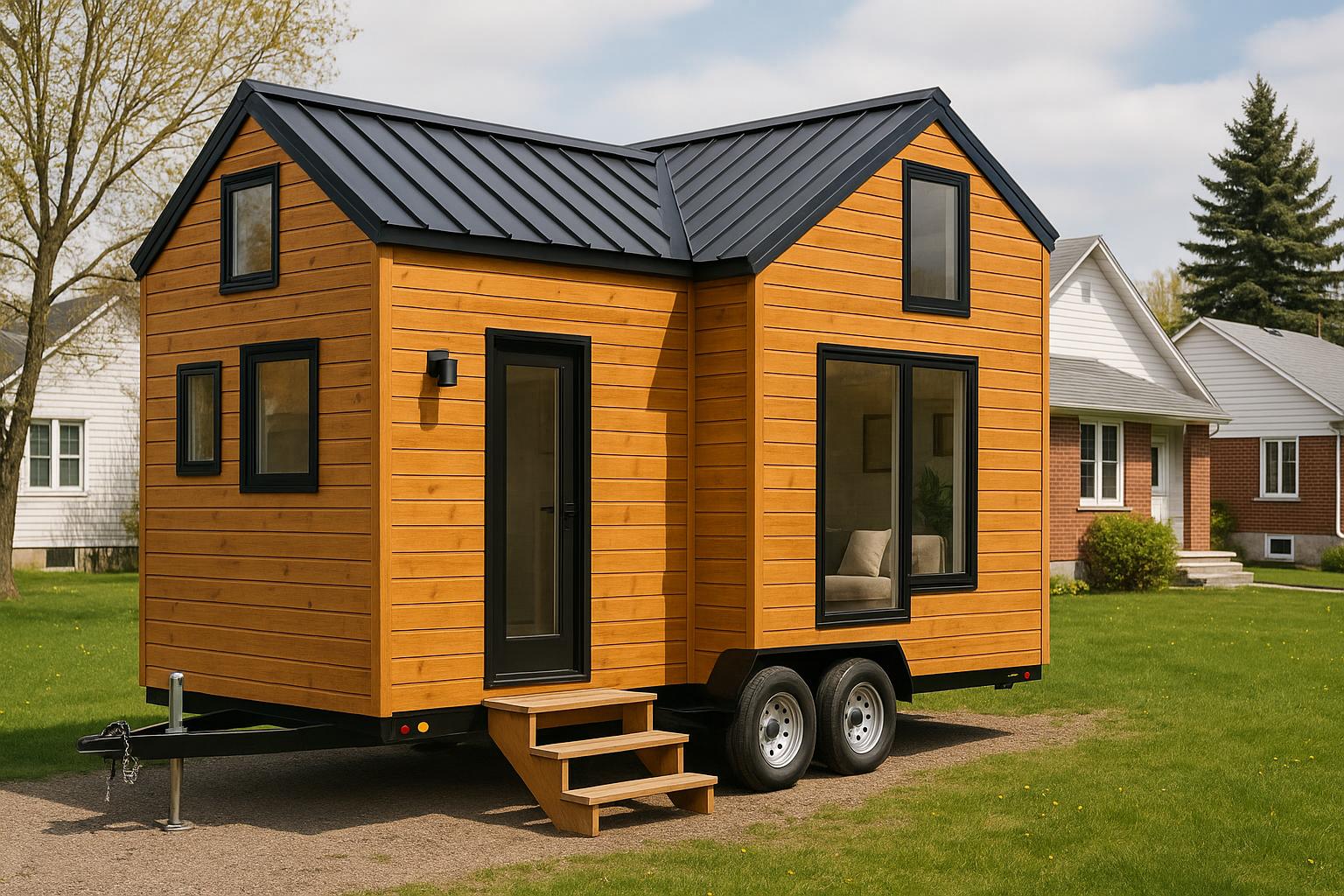
Tiny Home Resale Canada: Unlocking Value in the Pre-Owned ADU Market
Estimated reading time: 7 minutes
Key Takeaways
- *Tiny home resale in Canada is booming, fueled by affordability pressures and evolving urban policies.*
- *Pre-owned ADUs offer an attractive option with quick occupancy and lower upfront costs.*
- *Buyers should carefully verify permits, zoning, and condition while sellers can maximize appeal with strategic staging and clear documentation.*
- *Emerging trends like modular construction and energy-efficient upgrades are set to further transform the market landscape.*
Table of contents
- Introduction: Tiny Home Resale in Canada – A Growing Opportunity
- Overview of the Canadian Tiny Home Resale Market
- Market Trends Influencing Tiny Home Resale in the Canadian Market
- Advantages and Challenges of Buying Pre-Owned Tiny Homes and ADUs
- Selling Tips for Tiny Home Resale in the Canadian Market
- Key Considerations for Buyers in the Pre-Owned Tiny Home Market
- Future Outlook and Growth Potential: Tiny Home Resale Canada Trends
- Conclusion
- Frequently Asked Questions
Tiny home resale in Canada is emerging as a dynamic and increasingly relevant trend in the current real estate landscape. As more Canadians seek affordable solutions, pre-owned ADUs and tiny homes are carving out a new niche in the market. These compact, efficient homes—whether stationary, mobile, or secondary structures—offer living alternatives that are often under 400 square feet.
This shift is not just about size; it’s about practicality, flexibility and adapting to cost pressures in today’s economy. For readers new to this lifestyle and its benefits, see also Tiny Home Living: Your Complete Guide to Micro Homes, Sustainability, and Lifestyle Freedom.
Overview of the Canadian Tiny Home Resale Market
The Canadian tiny home resale market is on a clear growth trajectory. Beginning as a niche for minimalists, it now plays a significant role in offering affordable housing. Pre-owned ADUs are particularly attractive thanks to their affordability and immediate move-in potential.
Market Size and Growth
- *Projected market growth from $352.85 billion in 2024 to $432.53 billion by 2032.*
- *Robust CAGR of 3.88% evidences rapid adoption across the country.*
- *Pre-owned ADUs continue to gain interest due to their cost-effectiveness and readiness for occupancy.*
Contributing Factors
- Urban space constraints in major cities.
- Evolving housing policies that favor accessory units and alternative dwellings.
- Demographic shifts with increasing demand among young professionals, retirees, and downsizers.
- Immediate supply due to pre-owned status.
For more insights on zoning and regulations, check out Canadian ADU Regulations: A Comprehensive Provincial Guide to Secondary Suites, Zoning Laws, and Building Permits.
Source: Data Bridge Market Research
Market Trends Influencing Tiny Home Resale in the Canadian Market
Affordability Pressures
- *Rising average home prices have pushed many towards affordable alternatives like tiny homes and ADUs.*
- *Tiny homes lower the entry barrier for first-time buyers, single professionals, and retirees alike.*
- For a deep dive on innovative housing solutions, explore Affordable Housing: Innovative Solutions and Practical Strategies for Budget-Friendly Homes.
Urban Space Constraints & Zoning Regulation Changes
- *Densification trends in cities make compact living and ADUs more attractive.*
- *Cities such as Vancouver are updating zoning laws to support secondary suites and laneway homes.*
Demographic Shifts Driving Demand
- *Younger buyers facing financial constraints appreciate the affordability of tiny homes.*
- *Retirees and downsizers seek maintenance-light and cost-savvy housing options.*
- *Multi-generational families and those looking for rental income often consider pre-owned ADUs.*
- Learn more about family-oriented options in Multigenerational Living with ADUs.
Regional Hotspots and Market Impact
- *Cities like Calgary, Edmonton, and Montréal are experiencing strong growth in tiny home resale*
- *High-demand regions contrast with stricter markets such as Toronto and Vancouver.*
Source references include RE/MAX Blog and CMHC Housing Supply Report.
Advantages and Challenges of Buying Pre-Owned Tiny Homes and ADUs
Advantages
- Cost Savings: Pre-owned ADUs offer lower upfront costs compared to new builds.
- Quick Occupancy: These units require minimal wait time, bypassing the delays of new construction.
- Unique Character: Many tiny homes boast individual charm and custom features.
- Sustainability: Purchasing pre-owned units extends the life of existing building materials, promoting environmental responsibility. Read more on this in Tiny Home Living: The Ultimate Guide.
Challenges
- *Potential deferred maintenance and the need for updates or repairs.*
- *Zoning restrictions vary by municipality, affecting where these homes can be legally placed.*
- *Financing can be complex, with many lenders treating tiny homes differently than conventional properties.*
- *Insurance policies may require specialized coverage for non-traditional dwellings; see more in Tiny Home Legal Requirements Canada.
Sources: Data Bridge Market Research and RE/MAX Blog.
Selling Tips for Tiny Home Resale in the Canadian Market
Essential Selling Tips
- Showcase Cleanliness and Appeal: Deep clean and stage the unit with neutral décor to enhance natural light and space utility. For design inspiration, see Decorating a Secondary Suite.
- Prepare Comprehensive Documentation: Gather all permits, inspection records, and upgrade details to build buyer confidence. Detailed permit guidance is available at Navigating ADU Permits in Canadian Cities.
- Price Strategically: Research local market data to set a competitive price that reflects location and property features.
- Target the Right Buyer Pools: Market to downsizers, first-time buyers, and eco-conscious millennials via digital platforms and specialized agents. Explore strategies in Digital Nomads in Canada.
- Invest in Minor Upgrades: Small renovations like fresh paint or improved lighting can significantly enhance perceived value. For landscaping ideas, check Landscaping Ideas for ADUs.
Source: Data Bridge Market Research.
Key Considerations for Buyers in the Pre-Owned Tiny Home Market
Inspection and Legal Compliance
- Physical Inspection: Check foundations, roofing, plumbing, wiring and ensure all elements are current. Consider hiring a professional inspector.
- Appliance & Fixture Review: Test all features and assess energy efficiency upgrades.
- Permit Verification: Confirm that municipal permits, occupancy certificates, and zoning requirements are thoroughly met.
- Title and Lot Review: Ensure no legal encumbrances exist that could complicate ownership.
Financing and Insurance Options
- *Explore alternative financing such as chattel mortgages or personal loans, as conventional mortgages might not apply.*
- *Research insurance providers who understand the nuances of tiny homes and pre-owned ADUs.*
For more on financing options, refer to Tiny Home Financing Canada: Your Complete Guide.
Future Outlook and Growth Potential: Tiny Home Resale Canada Trends
The market for tiny home resale in Canada is projected to maintain its growth driven by steady policy reforms, construction innovations, and demographic shifts. Future trends include:
- *A steady growth forecast with a sustained 3.88% CAGR.*
- *Policy reforms that improve zoning and allow more flexible setups for ADUs and tiny homes.*
- *Construction innovations such as modular designs and smart home integrations enhancing market appeal.*
- *Renewed momentum in regions like Calgary, Edmonton, and Montréal as reforms and incentives take effect.*
- For a deeper view on sustainability, check Net-Zero ADU: Building Sustainable Communities.
Sources: Data Bridge Market Research and CMHC Housing Supply Report.
Conclusion
Tiny home resale in Canada is not a fleeting trend—it is a robust, dynamic solution that meets the needs of a diverse range of buyers and sellers. Pre-owned ADUs and compact living options provide affordability, flexibility, and a stepping stone towards sustainable living.
Success in this niche market relies on careful research, strategic selling practices, and adherence to local zoning and financing norms. Whether you are buying or selling, staying informed and adaptable is key to thriving in this evolving landscape.
For further insights, visit Data Bridge Market Research and RE/MAX Blog.
Frequently Asked Questions
What defines a tiny home or pre-owned ADU in Canada?
A tiny home or pre-owned ADU is typically characterized by its compact footprint—often under 400 square feet—and its ability to serve as either a primary or secondary residence. These units are designed for efficient living and can be either stationary or mobile.
How do I finance the purchase of a pre-owned tiny home?
Financing options may differ from conventional mortgages. Many buyers turn to credit unions, chattel mortgages, or personal loans, and it’s important to consult with lenders experienced in alternative housing financing. For comprehensive guidance, refer to Tiny Home Financing Canada: Your Complete Guide.
Are there special zoning or permit requirements for tiny homes?
Yes, zoning and permitting regulations can vary dramatically between municipalities. It is essential to verify that the tiny home or ADU complies with local building codes and zoning laws before making a purchase.
What should I look for during a physical inspection of a tiny home?
During an inspection, focus on the condition of the foundation, roofing, plumbing, wiring, and appliances. Hiring a professional home inspector can help ensure that no critical issues are overlooked.

Leave a Reply